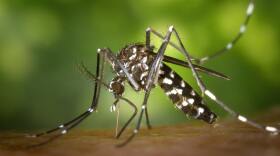In khaki shorts and a Manchester Health Department polo shirt, Karen Sutkus ventures into a patch of woods in the city through a cloud of DEET.
Most of us spend the summer trying to get away from mosquitoes – spraying and smacking our way through the season. But from July through October, every year, Sutkus spends her time attracting the insect the rest of us are trying to avoid.
As an environmental health specialist with the City of Manchester, it’s her job to catch and identify the insects, then send them to get tested for common illnesses they might be carrying, like West Nile Virus, or Eastern Equine Encephalitis, which can be deadly for humans.
On a hot July day recently, she’s out to gather as many mosquitos as she can. To draw the insects in, her team set nine traps total, in three different parts of Manchester.
From a distance, the traps look like just a collection of boxes, nets, and buckets. But attracting mosquitoes is actually harder than you might think. One of Sutkus’ traps uses light and carbon dioxide, which humans exhale, to trick the insects into thinking it’s a person they can bite.
“The mosquito is coming in to have a blood meal – they come in and they think that they are going to do so – but unfortunately it's the trap,” she said. “They get sucked down into the net where we then collect them.”
Another trap uses stinky water, brewed like a tea with hay provided by a local horse barn. A third uses scent to lure mosquitoes in, then sweeps them up into a fan where they meet their scientific fate.
When it’s time to transport them to her lab, Sutkus just uses a simple cooler filled with dry ice in the trunk of her car.
“That will start to freeze them and essentially suffocate them so that when we get back to the office, they should be pretty well dead,” she said.
Back at the Manchester Health Department, Sutkus brings the frozen mosquitoes to a small lab. It kind of looks like a high school science classroom, with petri dishes, microscopes, and a life-size model of a rat. Things can get dicey when the insects start to warm up.
“Sometimes if they’re not frozen enough they start to come back to life when they’re under the microscope. That's a little scary. They start to fly back up at you,” she said.

Sutkus sits down to sort the mosquitos by gender, genus and species, bringing a carefully trained eye to the process. Under the microscope, the insects look different than they do buzzing around in the middle of a picnic. They’re more elegant – even pretty, Sutkus says. Especially the Uranotaenia Sapphirina.
“It’s got this very iridescent blue scaling on it, really pretty, she’s a cute one,” she said.
Not every mosquito gets sent in for testing. Certain mosquito species mostly bite birds, or reptiles. And turns out male mosquitoes don’t bite humans at all, though she still gives them a careful look.
“You can see how the antennae are really kind of bushy on the male. Like he needs to shave,” she said.
Sutkus collects as many as 150,000 insects each season, and her skills have earned her the nickname “mosquito lady”
But when the weather starts to turn, she has other city health business to keep her busy: managing daycare inspections, food safety training, garbage complaints, and septic systems, among other things.
But come next summer, she’ll be back in the woods, on the hunt.












